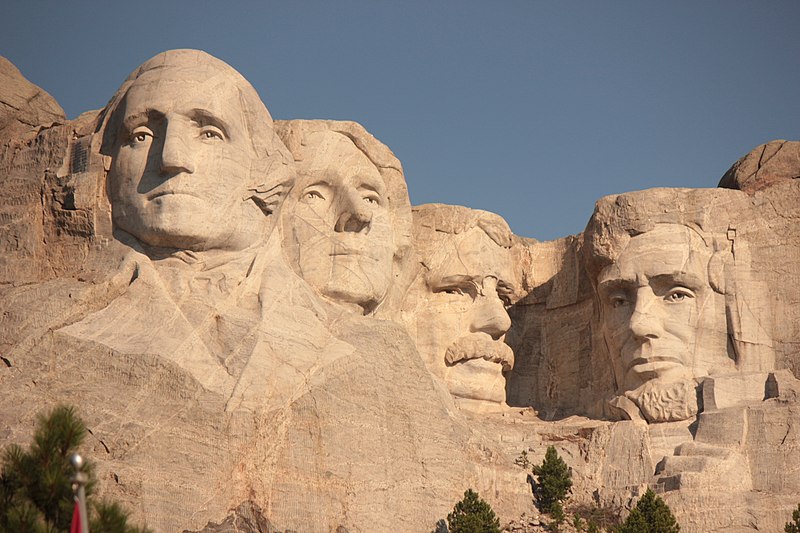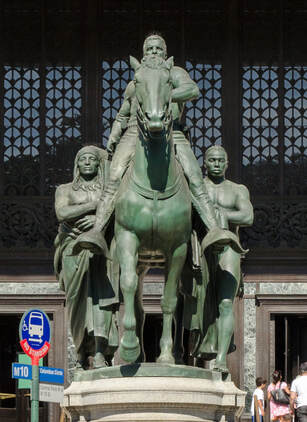|
By the Reverend Dr. Warren Crews Today we are using the special lessons for Independence Day. Given all that is going on in our country, it seems like something important for us to do. On this weekend it is traditional to recall all of the ideals our country was founded upon. Yet, this year we are being forced to look back at some of the things about our founding fathers that were not very ideal—like their accepting slavery and often owning slaves. They spoke often about liberty and justice for all — except for African slaves (whom the Constitution counted as only 3/5ths human beings) and Native Americans (whom they dismissed as mere savages). So, now there is a movement to remove all the statues, portraits, and names of buildings and streets honoring those involved in oppressing people of color. And, finally, this year most of our traditional parades and concerts have been cancelled because of the virus. This is one strange Fourth of July weekend! Our music today honors the struggle for freedom, justice, and peace that face people of color every day. We began our service with the stirring hymn that looks back to the deadliest war we have ever fought with a half million deaths. The Battle Hymn of the Republic begins by referring to God’s “coming to trample down the vintage where the grapes of wrath are stored with the fearful lightning of God’s swift sword”. We also heard what is called the African-American national anthem, Lift Every Voice and Sing, so beautifully sung by Gina Malone. It reminds us of the stony road that African Americans have trod in search of the freedom promised to us all by the founders of our country. We will finish the service singing We Shall Overcome, so often sung in marches protesting racial injustice. It expresses the hope of us all that we will be able to overcome all that demeans and oppresses people of color. So then, what do our biblical lessons for today offer us as we seek to support these efforts to dismantle racism? Our lessons and our songs are about celebrating our freedom to live with liberty, justice and the pursuit of happiness. Also, we have all been taught that our country was founded with on the fundamental principle that we are all equal under the law. Yet, it is so abundantly clear that this claim of freedom for all is heard very differently in the white community than by people of color. I would add that there also is a growing divide in our country between those who understand liberty as freedom from anyone telling us what we must do, on the one hand, and those who understand liberty as freedom for pursuing all those freedoms for everyone, regardless of race, religion, politics or anything else that divides us. So, again, what do our biblical lessons say to enlighten and empower us to pursue those freedoms for all? Our lesson from the Hebrew scriptures reminds us that we are to seek justice for those who most need help: widows, orphans, and strangers, including providing for their food and clothing. Our epistle lesson reminds us that in this life we are all immigrants of sorts, seeking life in a better country, a heavenly one. In the Sermon on the Mount, Jesus taught his disciples that they are not only to love their neighbor, but also to love their enemies, including those who persecute them. All of these prescriptions for justice and peace certainly do sound like a call for perfection, something beyond most people in our very individualistic country. Might there be some in-between steps between blindly accepting the status quo that benefits us, but not a great many others, on the one hand, and these calls to a very perfectionist way of life, on the other? How might our churches help us here? The simple answer is that the churches have always preached seeking to balance justice and mercy. Getting that right balance is no small matter, but is the only one that is the pathway to a lasting peace, something in short supply right now. This search begs for a concrete example.
Now, it is not difficult to list some of Roosevelt’s important progressive reforms, like establishing rules to protect civil servants, to guarantee the purity of our food and drugs, and to break up monopolies, as well as his conservation efforts. Much to honor him with a statue. But, there was another, alas, dishonorable side to Teddy Roosevelt. He was what today we would call a white supremacist. He believed that slavery was evil because it brought an inferior race to the United States, and he actually said that the best Indian is dead one! Given those despicable sentiments, the inclusion of an Native American and an African alongside him as part of the statue is unacceptable because it reminds us of the evils of the seizure of Native American lands and forcing them onto pitiful reservations, as well as the horrific history of chattel slavery and Jim Crow discrimination against African Americans. So, it is not a surprise that the trustees of that museum decided to remove the statue. But, what about the more generic honoring of Roosevelt with one of the four giant heads carved out of the side of Mount Rushmore (at the top of the page), where our president was at on Friday to watch fireworks? Would we want to blast his face out? Or, is it possible to honor his progressive work, especially his championing of the conservation movement, while also reminding everyone of his racist history? I agree wholeheartedly with the removal of his statue in New York City, because of the inclusion of the Native American and African. I wouldn’t want to destroy Mount Rushmore (although I do understand the reasons why many Native Americans might want to do so), but I would want to make sure that both sides of Roosevelt (as well as the other three presidents for that matter) are clearly taught. Honor where honor is due, truth-telling where injustice has been done. Incidentally, those standards of justice, mercy, and truth-telling also apply to us for none of us is free from being entangled in a culture full of discrimination and racism. One final personal note: While in seminary, I decided to participate in the great 1964 March on Washington to support the civil rights movement. Alas, that greatly angered my father, and disrupted our relationship for awhile. It was my mother’s great love for each of us that enabled us in due time to disagree on racial justice matters, but to continue loving one another. No statues were pulled down, but I think Jesus would have approved of such love. Amen. The Reverend Dr. Warren Crews is co-priest in charge at St. John's.
0 Comments
Leave a Reply. |
Editorial contactVarious members of the St. John's congregation contribute to this blog. For editorial suggestions, contact Jeff McIntire-Strasburg at [email protected] Archives
May 2024
CategoriesAll Bishop Deon Johnson Book Group Congregation Members Deacons Diocese Of Missouri Episcopal Church Features General Information Parish Events Podcast Presiding-bishop-michael-curry Sermons Terms-of-transition Vestry |


 RSS Feed
RSS Feed

